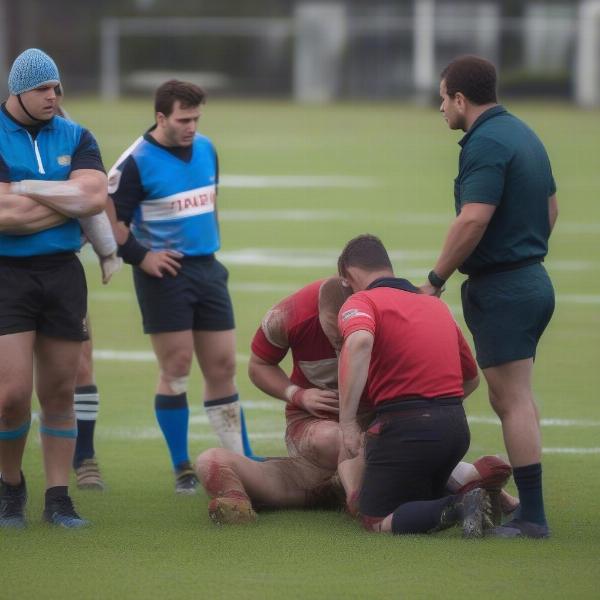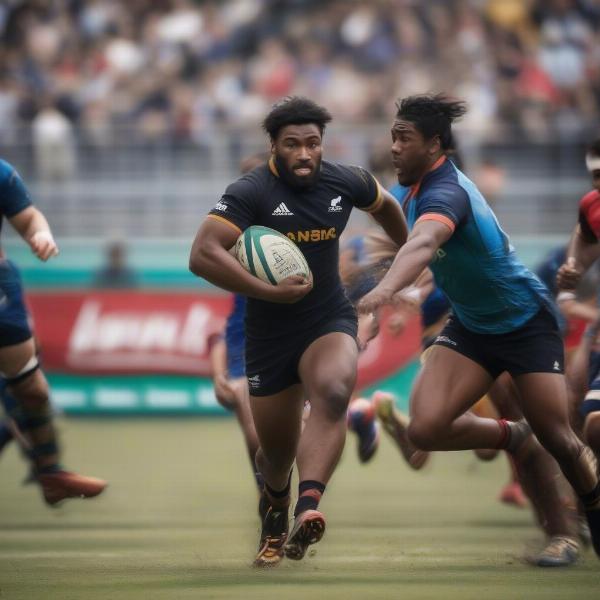A standard game of rugby lasts 80 minutes, divided into two 40-minute halves. However, the actual time it takes to play a rugby match can vary depending on several factors, such as stoppages, injuries, and the level of play. Understanding these nuances is crucial for anyone wanting to fully grasp the flow and timing of this exciting sport.
Decoding Rugby’s 80 Minutes: Regulations and Real-Time
While the official game clock dictates 80 minutes of play, the real-time duration often extends beyond that. Stoppages for injuries, substitutions, penalties, and scrums contribute to added time. The referee is responsible for tracking this lost time and adding it on at the end of each half, often referred to as “injury time” or “stoppage time.” This makes predicting the exact finishing time of a rugby match a challenge. The level of play, from amateur to professional, also impacts the average game length. Professional games tend to have more structured play and fewer stoppages compared to amateur matches.
Understanding Stoppages in Rugby
Numerous events can lead to temporary halts in play. These interruptions, while sometimes frustrating for viewers, are integral to the sport and ensure fair play and player safety. Some common reasons for stoppages include:
- Injuries: Player welfare is paramount, and any injury requiring assessment necessitates a pause in the game.
- Substitutions: Teams are permitted a limited number of substitutions, and these exchanges require a brief stoppage.
- Penalties: Rule infringements result in penalties, often leading to scrums, free kicks, or penalty kicks, each requiring a set-up time.
- Scrums and Lineouts: These set pieces, fundamental to rugby’s strategic play, involve specific formations and restarts, inevitably causing breaks in the continuous flow of the game.
- TMO (Television Match Official) Reviews: In professional rugby, the TMO can review certain decisions, leading to longer stoppages for deliberation.
 Rugby Game Stoppage Due to Player Injury
Rugby Game Stoppage Due to Player Injury
Variations in Game Length Across Different Rugby Formats
While standard rugby union follows the 80-minute format, other variations exist, each with its unique timing regulations. Rugby sevens, a faster-paced version of the game, consists of two seven-minute halves with a two-minute half-time break. This shorter format demands higher intensity and fitness levels from the players. Furthermore, youth rugby matches often have reduced playing times to accommodate the younger players’ physical capabilities. Understanding these differences is essential when following different forms of the game.
Rugby Sevens vs. Rugby Union: A Tale of Two Halves
The time difference between rugby sevens and traditional rugby union significantly impacts the game’s dynamics. The shorter duration of sevens leads to more explosive plays, emphasizing speed and agility. While strategic elements remain crucial, the reduced playing time necessitates quicker decision-making and a higher tempo.
 Fast-Paced Action in Rugby Sevens
Fast-Paced Action in Rugby Sevens
How Long is Extra Time in Rugby?
In knockout competitions, if a match ends in a draw, extra time is played to determine a winner. Extra time typically consists of two 10-minute halves. If the scores remain level after extra time, a sudden-death period may be implemented, or a kicking competition may decide the victor. These scenarios add further complexity to calculating the overall duration of a rugby match and contribute to the sport’s unpredictable nature.
Sudden Death and Penalty Kicks: The Final Showdown
The tension of a drawn rugby match heightens during extra time and potential sudden death or penalty kick scenarios. Sudden death, where the first team to score wins, can end abruptly, leaving fans on the edge of their seats. Penalty kicks, while less dramatic in terms of open play, demand immense pressure and skill from the kickers, offering a nail-biting finale to an already intense contest.
Beyond the 80 Minutes: Factors Influencing Game Duration
While regulations stipulate the basic framework of a rugby match, various factors can influence its overall length. Weather conditions, such as heavy rain or lightning, can lead to temporary suspensions. Furthermore, the referee’s discretion in managing the game and controlling time adds another layer of variability. Unforeseen circumstances, while rare, can also disrupt play, impacting the match’s final duration.
Factors Affecting the Length of a Rugby Game:
- Stoppages for injuries and other incidents: As mentioned, these can significantly add to the overall game time.
- The referee’s discretion: The referee has the final say on the amount of stoppage time added.
- Television match official (TMO) reviews: In professional games, these reviews can cause significant delays.
- Weather conditions: Bad weather may lead to temporary suspensions or delays.
Tips for Spectators Attending a Rugby Match
- Arrive early: This gives you time to find your seats and soak up the pre-match atmosphere.
- Be prepared for delays: Pack accordingly for potential weather changes and extra time.
- Stay hydrated: Especially during warmer months, bring plenty of water to stay hydrated.
- Learn the rules: Understanding the game’s nuances enhances the viewing experience.
Conclusion
So, How Long Is A Game Of Rugby? While nominally 80 minutes, the true answer is more complex. Stoppages, different formats, and extra-time scenarios all contribute to a fluid timeframe. Understanding these variables enhances appreciation for the strategic depth and exciting unpredictability that defines this captivating sport. Next time you’re watching a match, remember that the clock only tells part of the story.
FAQs
- What is the standard length of a rugby union match? 80 minutes (two 40-minute halves).
- How long is a rugby sevens match? 14 minutes (two 7-minute halves).
- What happens if a rugby match is tied after regulation time? Extra time is played, typically two 10-minute halves.
- What is sudden death in rugby? The first team to score after a tie in extra time wins the match.
- What are some common reasons for stoppages in rugby? Injuries, substitutions, penalties, scrums, lineouts, and TMO reviews.
- Why does the actual playing time of a rugby match often exceed 80 minutes? Due to stoppages and injury time added by the referee.
- How long is half-time in rugby? Typically 10 minutes, but can vary slightly.

